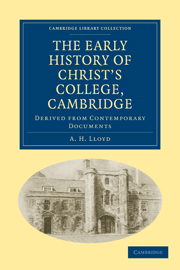Book contents
- Frontmatter
- Preface
- Contents
- LIST OF ILLUSTRATIONS
- List of Abbreviations
- Chronological Summary
- Dedication
- Chapter I William Byngham, the First Founder
- Chapter II The Dispute with John Langton
- Chapter III The First Royal Licence, 1439
- Chapter IV The Expansion of the Milne Street Site
- Chapter V The Royal Licences of 1442
- Chapter VI Marking Time: 1443 to 1446
- Chapter VII The Royal Licence of 1446 and its period
- Chapter VIII The Foundation Charter of the College of Godshouse and its period
- Chapter IX The Relationship of Godshouse and Clare Hall
- Chapter X The Last Days of William Byngham
- Chapter XI The Proctorship of John Hurte, 1451–1458, and of William Fallan, 1458–1464
- Chapter XII The Proctorship of William Basset, 1464–1477
- Chapter XIII The Proctorship of Ralph Barton, 1477–1490
- Chapter XIV The Proctorship of John Syclyng: Early Years, 1490–1496
- Chapter XV The Proctorship of John Syclyng: Later Years, 1496–1506
- Chapter XVI The Negotiations between Godshouse and the Lady Margaret
- Chapter XVII Syclyng's Death and Will
- Chapter XVIII The Buildings and Furniture remaining from the Godshouse period
- Chapter XIX Godshouse and Christ's College
- Appendix
- Index
- Plate section
Chapter X - The Last Days of William Byngham
Published online by Cambridge University Press: 05 October 2010
- Frontmatter
- Preface
- Contents
- LIST OF ILLUSTRATIONS
- List of Abbreviations
- Chronological Summary
- Dedication
- Chapter I William Byngham, the First Founder
- Chapter II The Dispute with John Langton
- Chapter III The First Royal Licence, 1439
- Chapter IV The Expansion of the Milne Street Site
- Chapter V The Royal Licences of 1442
- Chapter VI Marking Time: 1443 to 1446
- Chapter VII The Royal Licence of 1446 and its period
- Chapter VIII The Foundation Charter of the College of Godshouse and its period
- Chapter IX The Relationship of Godshouse and Clare Hall
- Chapter X The Last Days of William Byngham
- Chapter XI The Proctorship of John Hurte, 1451–1458, and of William Fallan, 1458–1464
- Chapter XII The Proctorship of William Basset, 1464–1477
- Chapter XIII The Proctorship of Ralph Barton, 1477–1490
- Chapter XIV The Proctorship of John Syclyng: Early Years, 1490–1496
- Chapter XV The Proctorship of John Syclyng: Later Years, 1496–1506
- Chapter XVI The Negotiations between Godshouse and the Lady Margaret
- Chapter XVII Syclyng's Death and Will
- Chapter XVIII The Buildings and Furniture remaining from the Godshouse period
- Chapter XIX Godshouse and Christ's College
- Appendix
- Index
- Plate section
Summary
The latest dated document relating to the first proctorship is that of 8 December 1450 concerning the parsonage of Trellage, and the fewness of documents from June 1449 onwards is to be expected, following upon the spate of charters, grants, leases, surrenders and releases in the preceding years. The foundation of the college as a corporate body, the transfer to its perpetual ownership of the properties acquired for its home and for its endowment, and the letting upon lease of the latter, set the Proctor and scholars comparatively free to devote their attention to those internal affairs which while forming their main purpose have left little trace in records for the use of the historian.
Byngham is said to have been proctor of the university in 1446, and the statement is found in the Historical Register, but it is inherently improbable. That official statement derives from the Introduction to Grace Book Γ, which in its turn gives Fuller as authority, but the only sources upon which absolute reliance for the names of fifteenth-century university proctors may be placed are the contemporary documents preserved in the University Registry. These are the manuscripts of the Grace Books from 1455 onwards, and those of the Proctors' Indentures, from 1430 with occasional lacunae but including an earlier sheet which supplies the names of proctors for 1362 and 1363.
- Type
- Chapter
- Information
- The Early History of Christ’s College, CambridgeDerived from Contemporary Documents, pp. 121 - 138Publisher: Cambridge University PressPrint publication year: 2010First published in: 1934



